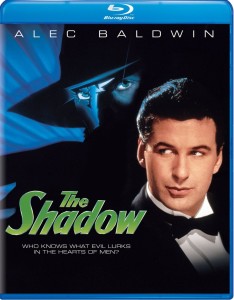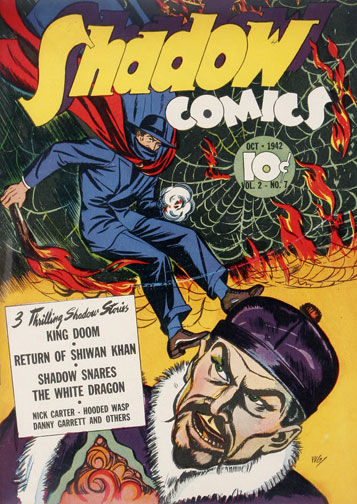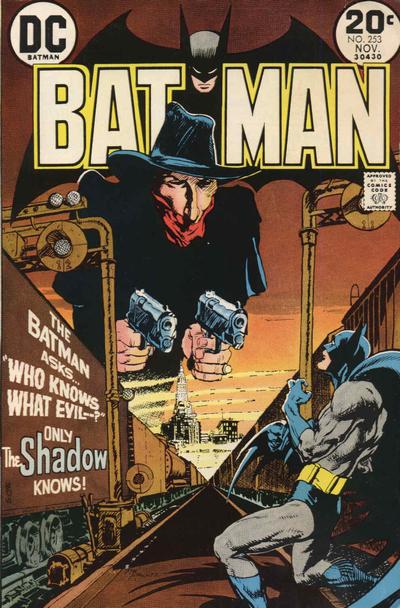“The weed of crime bears bitter fruit. Crime does not pay. . .The Shadow knows!”
(And so does my friend Will Murray, who I would like to thank! Will not only gave me permission to use his published quotes, but he contributed NEW material for this article.
Thanks Will!)
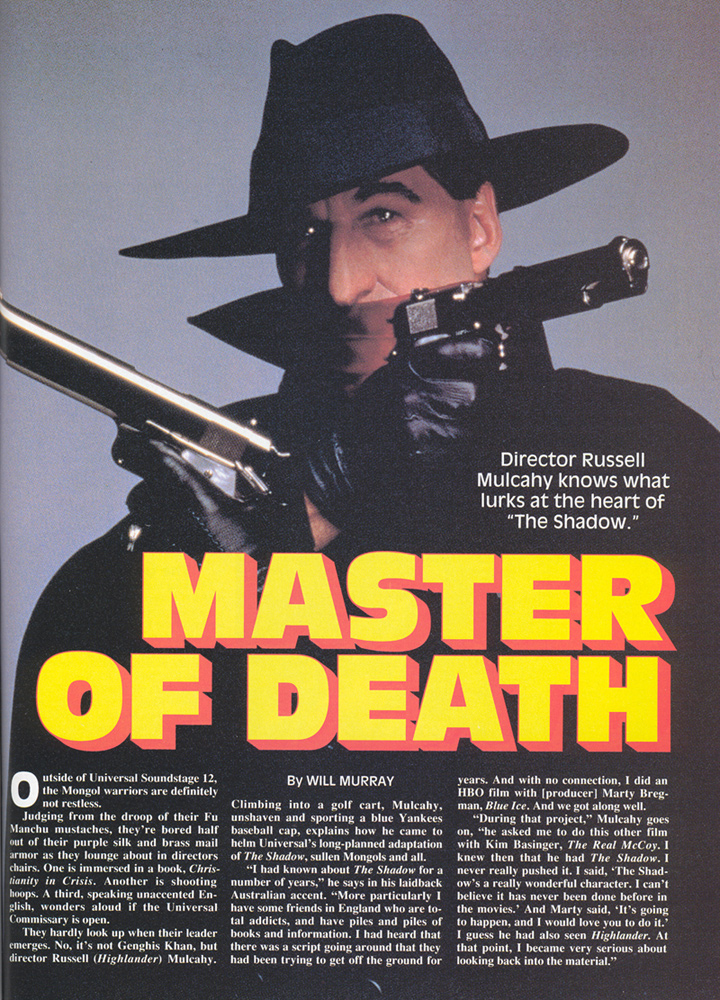
This is about the 1994 Shadow movie being released on Blu-ray for the first time this week. Its previous DVD incarnation was pan and scan, this is the first time it has been released widescreen.
First and foremost, the Shadow was NOT always Lamont Cranston. In the original stories published by Street and Smith, Cranston was another person, a rich playboy type whose identity the Shadow stole, or occasionally borrowed. Cranston didn’t like this, but went along with it because the Shadow scared him.
So when this comic book movie opens, we see Lamont Cranston in Asia, a bad person, a murderer, about to be set straight by a Mystic Asian Master, we know that this movie will NOT be following the books closely.
The pulp publications of the Shadow started in 1930, eight years before Superman and the other super-heroes took over comic books. The Shadow had the power to cloud men’s minds and makes himself seem invisible. The Shadow quickly became a radio show and voices, such as Orson Welles are still remembered saying such things as “The Shadow Knows.”
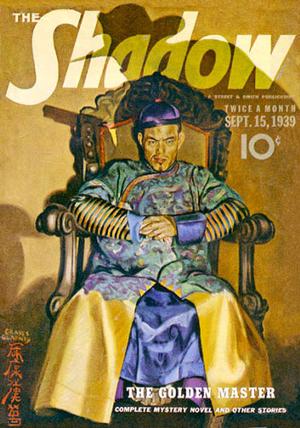
This is a “comic book movie.” While the Shadow does have a Comic Book and comic strip history, I do NOT use that term as a good thing. Comic books do have a logic all their own: people look good in silly, impractical costumes, that have powers no one else have, people don’t recognize them if they wear glasses and so on. Yet, movies such as Superman and Spider-Man have made that work and we can have fun. Too often, Hollywood and their writers just take the costume, the setting and the powers and leave out the characterization and other elements that make a hero interesting. And they give it to writers who seem to know nothing of the character. That happens here.
This is a bad, uninvolving movie. It cannot make up its mind what kind of movie it is. At one point it is a fantastic surreal movie that might have absorbed the viewer. At other times it tries to come off as a comic take of the Shadow legend. At other times it attends to be serious and have a certain morality about it which it never truly is achieves.
It has an interesting cast that it completely wastes. Ian McKellen, Gandalf from the Lord of the Rings movies and Magneto from the X-Men, could have had an important role here. But this part is written so badly that he never is allowed to fully get into the role. Jonathan Winters is also in the movie along with Peter Boyle and Tim Curry, which would mean that you would either have a very funny take on the Shadow and they could do that, or a very serious one, they could do that too. But their characters are never developed and their talents are never used. Alec Baldwin perhaps does his best here to try to give a three dimensional performance. But the writing fails and the character never seems real or consistent.
The villain of this movie is an ancient evil Asian named Khan. As with all the immortal bad guys when they come back to life they immediately know how to live in the modern world around them. And Khan knows everything there is to know about the Shadow.
The bi-weekly Shadow stories were mostly written by Walter Gibson under the pen name of Maxwell Grant. “Partners in Peril” was the first story for pitch hitter Theodore Tinsley.
A Batman mention here is relevant because it wasn’t for the Batman movie in 1989 there would not have been a Shadow movie in 1994. Copying Batman, thee producers of this movie obviously lifted its art deco look and used New York. At times it worked and it times it didn’t.
Will Murray points out in his introductory essays on the Shadow, published in new reprints, that Batman was very much influenced by the Shadow. In fact Bill Finger, the original writer on Batman said “I was very much influenced by the Shadow and Doc Savage, the Phantom and things of that sort. We explain Batman’s potential. My idea was to have Batman be a combination of Douglas Fairbanks, Sherlock Holmes, The Shadow and Doc Savage as well.”
Will reminds us that Batman once carried a 45 automatic. He quotes Finger saying.” I had Batman use a gun to shoot a villain and I was called on the carpet by my editor. We didn’t think anything was wrong with Batman carry a gun because the Shadow used one.
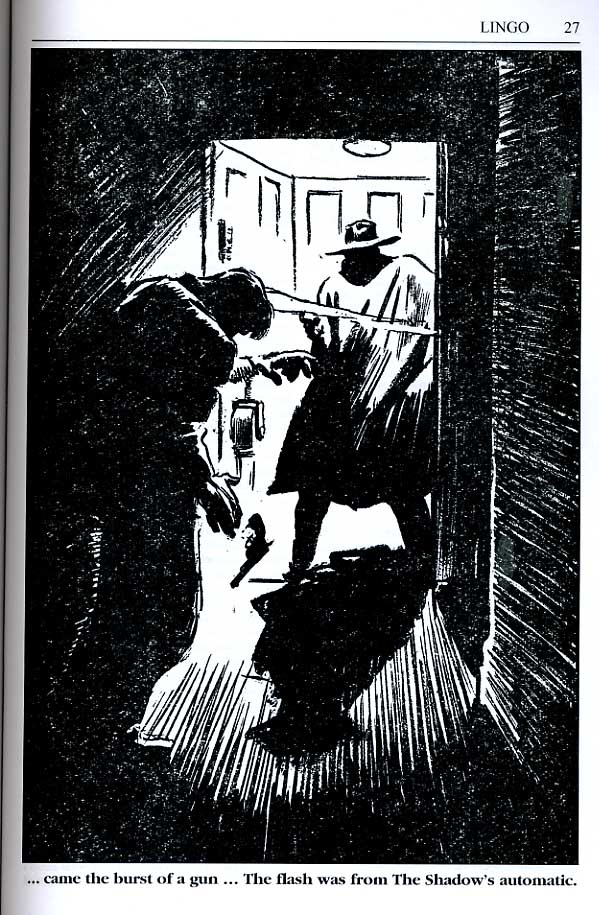
In Detective Comics #29 Batman scaled a building using a pair of suction gloves and kneepads identical to a raid the Shadow had been using since 1932. Finger admitted that Batman’s utility belt was modeled after a mini pocketed yellow gadget belt that Doc Savage started wearing in 1937. Murray writes that The Shadows greatest impact on Finger was never been revealed recently. Bill Finger said, “My first script was a takeoff of a Shadow Story.” That story was “Partners in Peril” as the blueprint for Batman. It contains many of the same scenes and characters, but with different names.
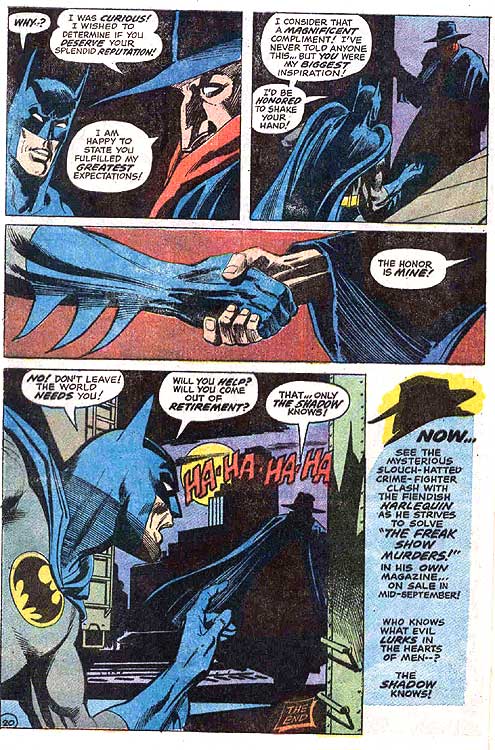
Will Murray writes this just for us!
Back in the day, I spent two wild weeks observing the filming of The Shadow film starring Alec Baldwin. Not that I was invited on the set every day of those two weeks. No, for some strange reason, whenever Baldwin was in full Shadow cloak and makeup, I was instructed to stay off the Paramount lot. Still, I spent many hours seated beside director Russell Mulchahy, taking notes.
I had been sent to cover the filming for Starlog magazine, which was doing the official licensed Shadow film. One of my chief recollections was watching them do take after take of the throne room sequence, where the beryllium sphere broke loose. They shot it three ways, straight, comical and somewhere in between. This explains the uneven tone of the project. When they cut it, they used whatever take worked best, regardless of the overarching mood that should have kept the proceedings mysterious.
I knew Walter Gibson, who created The Shadow, pretty well, and while I was sorry that he never lived to see this movie, part of me is glad he was spared the indignities to which his immortal Dark Avenger was subjected.
Sadly, with the Shadow being invisible you could have a lot of fun with the soundtrack having a disembodied voice all over the place. But they don’t here. Once again you can see that the movie was set up to be first in the series perhaps. But they almost use that is an excuse not to fully develop any of the characters. This movie was mostly dull.
I give the movie a 4.5 on a one to five scale for its video and a 4.25 for the audio.
